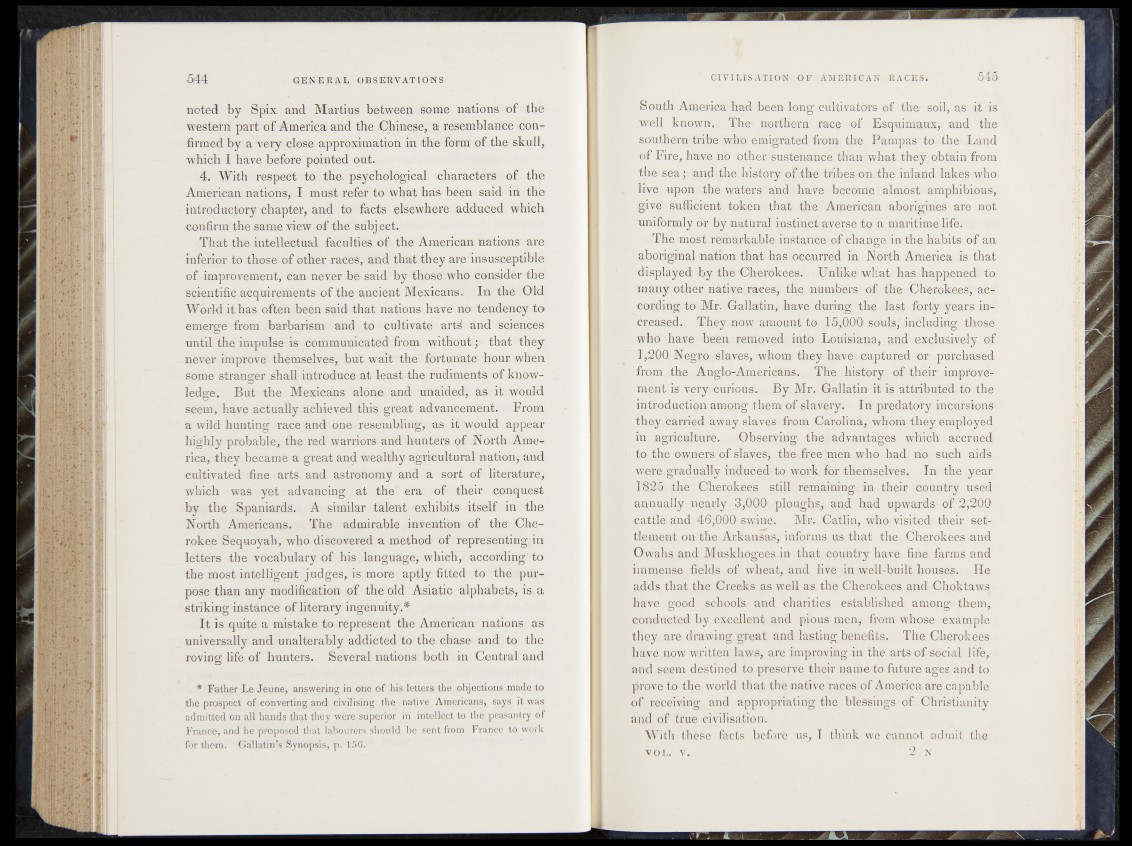
noted by Spix and Martins between some nations of the
western part of America and the Chinese, a resemblance confirmed
by a very close approximation in the- form of the skull,
which I have before pointed out.
4. With respect to the psychological characters of the
American nations, I must-refer to what has been said in the
introductory" chapter, and to facts elsewhere adduced which
confirm the same view of the subj ect.
That the intellectual faculties of the American nations* are
inferior to those of other races, and that they are insusceptible
of improvement, can never be said by those who consider the
scientific acquirements of the ancient Mexicans. In the Old
World it has often been said that nations have no' tendency to
emerge from barbarism and to cultivate a-rtd and' sciences
until the impulse is communicated from without; that they
never improve themselves, but wait the fortunate hour, when
some stranger shall introduce at least the rudiments df knowledge.
But the Mexicans alone and unaided; as it would
seem, have actually achieved this great advancement. From
a wild hunting race and one resembling, as it would appear
highly probable, the red warriors and hunters of North Ame^
rica, they became a great and wealthy agricultural natiom^and
cultivated fine -arts and astronomy and a sort of literature;
which was yet advancing at the' era of their conquest
by the Spaniards. A similar talent-^exhibits itself in the
North Americans. The admirable inventibn of the Cherokee
Sequoyah, who discovered a method of representing in
letters the vocabulary of his language, which, according to
the most intelligent judges, is more aptly fitted to the purpose
than any modification of the old Asiatic alphabets, is a
striking instance of literary ingenuity.#
It is quite a mistake to represent the American nations as
universally and unalterably addicted to the chase and to the
roving life of hunters. Several nations both in Central and
* Father Le Jeune, answering in one of his letters the objections made to
the prospect of converting and civilising the native Americans, says it was
admitted on all hands that they were superior in intellect to the peasantry of
France, and he proposed that labourers should be sent from France to work
for them. Gallatin’s Synopsis, p. 156.
South America had been len^bultivators of the soil, as it is
well known, - The - - race« of Esquimaux, and the
southern tribe who emigrated from the Pampas to the Land
s' of Fire, have no other sustenance than what they obtain from
the sea ; and the history of the tribes on the inland lakes who
livp upon the waters and- have become almost amphibious,
give^ufficient token .that the American aborigines are not
, uniformly or by natural instinct averse to a maritime life. ,
The most remarkabfo.instaheei of change in the habits of an
f aboriginal nation that has ^occurred in No'rth America is that
displayed by tb© Cherokecs*» Unlike what has happened to
many other native races, the numbers of the Cherokees, ac^*
cording to Mr. Gallatin, have during: the last forty years increased.
They now amount tot^^Oftsouls; including ;those
who,: have ^ beenn^emoved into Louisiana, and ' exclusively of
l,2GQ..Negr©..slaves, whom, they have captured or purchased
i||om the Anglo-Americans. The history of their;, improvement
is very curious. By Mr. Gallatin it is attributed to the.
^ introduction among them of slavery. In predatory incursions
they carried.away slaves from Carolina, whom they employed
. in agriculture. Observing the. advantages which accrued
- to the owners of slaves; the free men who had no such aids
were gradually induced to work for themselves. In the year,
1 $25, the- Cherokees still .remaining in their country used
annually nearly 3/)00 ploughs, and had upwards of 2,200
■cattle and 46,000 swine. Mr. Catlin, who visited their settlement
on the Arkansas, informs? us that the Cherokees and
Owahs and Muskhogees in that country have fine farms and
immense fields of wheat, and live in well-built houses. He
adds that the Creeks as well, as the Cherokees and Choktaws
have good schools and charities established among*them,
conducted by excellent and pious men, from whose example
they are drawing great and lasting benefits. The Cherokees
have now written laws, are improving in the arts of .social life,
and seem destined to preserve their name to future ages and to
prove to the world that the native races of America are capable
of receiving and appropriating the blessings of Christianity
and of true civilisation.
With these facts before us, I think we cannot admit the
VOL. V. ; 2 N
ÊÊ